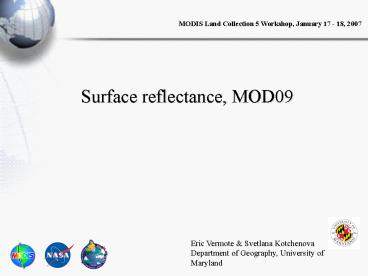Surface reflectance, MOD09 - PowerPoint PPT Presentation
Title:
Surface reflectance, MOD09
Description:
The surface reflectance product is an estimate of the surface spectral ... New look up tables based on 6SV including the latest dynamic aerosol models from ... – PowerPoint PPT presentation
Number of Views:37
Avg rating:3.0/5.0
Title: Surface reflectance, MOD09
1
Surface reflectance, MOD09
MODIS Land Collection 5 Workshop, January 17 -
18, 2007
Eric Vermote Svetlana Kotchenova Department of
Geography, University of Maryland
2
Surface reflectance (MOD09)
The surface reflectance product is an estimate of
the surface spectral reflectance for each band as
it would have been measured at ground level if
there were no atmospheric scattering and
absorption. Bands (in nm) 1 620-670
2 841-876 3 459-479 4
545-565 5 1230-1250 6 1628-1652
7 2105-2155 Home page http//modis-sr.ltdri.
org/html/surfref.htm
3
3
Atmospheric effect has a strong impact on
remotely sensed data
MODIS Granule over South Africa (Sept,13,2001,
845 to 850 GMT)
Corresponding aerosol optical thickness at 670nm
(0 black, 1.0 and above red) linear rainbow
scale. Clouds are in magenta, water bodies are
outlined in white.
RGB surface reflectance (corrected for aerosol)
RGB no correction for aerosol effect
4
Surface Reflectance as input to downstreamproduct
MODIS Land http//modis-land.gsfc.nasa.gov
2
5
MOD09 Collection 4
Collection 4 Terra Aqua Surface Reflectance
Daily L2G Global 250 m MOD09GQK
MYD09GQK Surface Reflectance Daily L2G Global
500 m MOD09GHK
MYD09GHK Surface Reflectance 8-Day L3 Global 250
m MOD09Q1
MYD09Q1 Surface Reflectance 8-Day L3 Global 500
m MOD09A1 MYD09A1 Surface
Reflectance Quality Daily L2G Global 1km
MOD09GST MYD09GST Availability February
2000 (July 2002) through December 2006
4
6
MOD09 Collection 5 Simplifying the data format,
please read the 1km QA flags
CMG Climate Modeling Grid
5
7
Collection 5 main changes
- New look up tables based on 6SV including the
latest dynamic aerosol models from AERONET
analysis - Refined inversion of the aerosol based on all the
available bands (in particular 412nm and 443nm)
and a stronger Red-Blue relationship (in
collaboration with the Aerosol group). - Improved internal (product specific) cloud and
snow screening
8
Atmospheric correction based on rigorous Vector
radiative transfer (6SV)
- http//6s.ltdri.org
- http//rtcodes.ltdri.org/
9
MOD09 Collection 5 Emphasis on validation
To analyze the performance of the MODIS
Collection 5 algorithms, we analyzed 1 year of
Terra data (2003) at 150 AERONET sites (4988
cases)
band 1
Percentage of good band 1 86.62 band 2
94.13 band 3 51.30 band 4 75.18 band 5
96.36 band 6 97.69 band 7
98.64 Theoretical error bar (0.005 5)
green gt 80, 65 lt yellow lt80, 55 lt magenta lt
65, red lt55
http//mod09val.ltdri.org/cgi-bin/mod09_c005_publi
c_allsites_onecollection.cgi
21
10
Mongu Zambia 116 cases analyzed Band 1 Good
93.7The percentages of observations that meet
the accuracy requirement of the MODIS surface
reflectance are reported in the graphs below for
116 cases. The surface reflectance obtained by
performing full atmospheric correction using
AERONET optical thickness and water vapor
measurements is considered the 'truth'.
Regression plots for each site can be displayed
by clicking on corresponding bar in the graph.
To ensure the use of AERONET measurements
representative of the MODIS acquisition
conditions, we filter out cases where the AERONET
AOT measurement does not occur within 30 minutes
of the MODIS acquisition or where the aeronet
aerosol model inversion is not performed within
1 day of the acquisition.
11
Mongu. Zambia 2003157 0845
Good Case
12
Mongu Zambia 2003126 0930
13
MOD09 Collection 5 assessing the impact on
downstream product (EVI/VI)
NDVI
Percentage of good NDVI 97.11 EVI
93.64 Theoretical error bar (0.02 2)
green gt 80, 65 lt yellow lt80, 55 lt magenta lt
65, red lt55
http//mod09val.ltdri.org/cgi-bin/mod09_c005_publi
c_allsites_onecollection.cgi
27
14
MOD09 Collection 5 assessing the impact on
downstream product (Albedo)
27
15
Future directions proposed 06-08
- Extend and refine the accuracy analysis
- Generate high accuracy reference data
- Coupled AERONET inversion with MODIS/MISR-MODIS/PO
LDER coincident data (collaboration with AERONET
Team) - Generalize of the accuracy analysis approach to
other standard directional reflectance products
(including those cited before)
AVHRR/VEGETATION/SeaWiFS/MERIS/TM
16
Collection 4/ Collection 5 Recommendations
- Use collection 5 when available
- It is ok to mix Collection 4 and collection 5 for
time series, but assess the impact on your
specific application - For subtle climate trend studies better to wait
for Collection 5 completion consistent record
and documented accuracy































